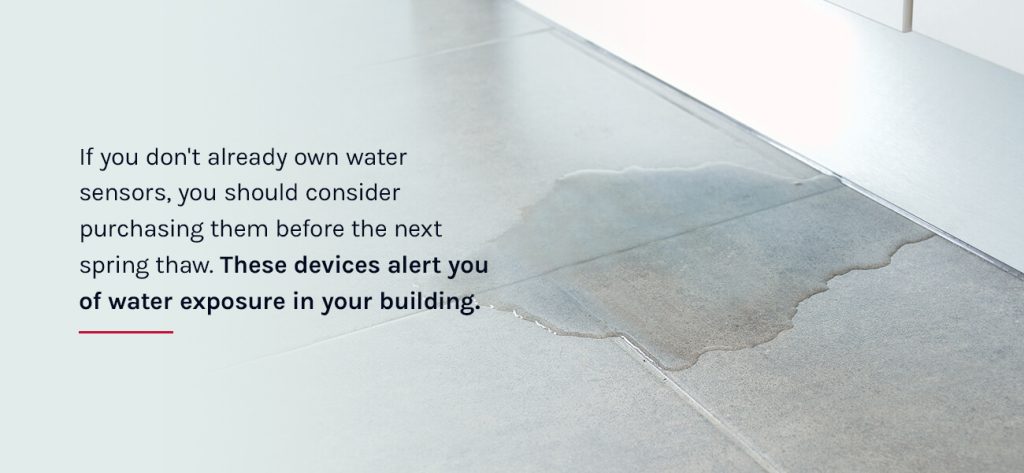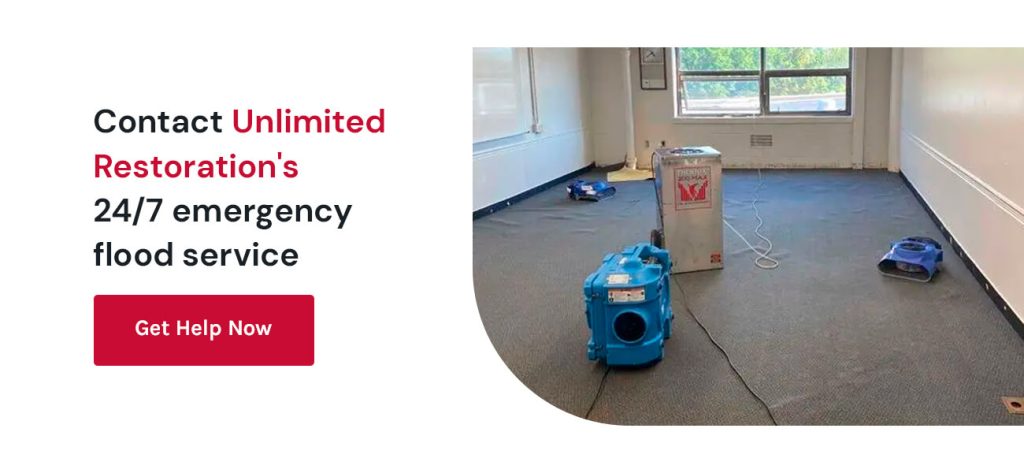As a business owner or manager, you know how critical it is to vigilantly protect your property. That includes preparing for potential flooding or water damage. Use this guide to learn how to anticipate changing weather patterns and what to do if your property experiences water damage or flooding.
A spring thaw happens when the temperature rises, melting any remaining snow. For businesses in snowy areas, this can be a potentially damaging time. These properties may experience flooding or other water damage if proper precautions are not in place.
Getting ready for a spring thaw is a best practice for businesses in every industry and size. Putting in a little extra effort to protect your property lowers the chances of you having to close down shop and lose money while you address water damage. Start preparing your commercial property for the spring thaw by following the steps below.
One of the simplest ways to prepare for a spring thaw is to remove the snow around your property. Taking the extra time to get rid of snow near your building will save you time, effort and money in the long run. To reduce the chances of water damage to your building, you can remove the snow yourself. If you’re in an area that experiences heavy snowfall, you may want to consider professional snow removal services to clear your property.
Before the spring thaw, you’ll want to inspect your property to identify potential problem areas. Look for structural issues like cracks in pipes or the building’s foundation. Also, keep an eye out for debris that could block drains and cause flooding issues. It’s wise to routinely inspect your property to catch any potential flooding issues before they happen.
Another crucial way to prepare your commercial property for a spring thaw is to check your drainage systems. Locate the flood drains outside and inside your building and ensure there is no blockage, especially from debris. If you notice anything in the way, you’ll want to remove it and continue to check back to make sure no other debris appears. These flood drains are vital in protecting your business from water damage, so it is critical to verify they are clear of potential obstructions.

If you don’t already own water sensors, you should consider purchasing them before the next spring thaw. These devices alert you of water exposure in your building. Especially in larger businesses or warehouses, you may not notice the signs of water damage at first, so these sensors can help you identify and fix the problem before it gets worse. Call a certified property restoration company to quickly and efficiently get your business back to running as usual.
Even with proper planning, an unexpected disaster may still happen. So, before the thaw, elevate all valuable items in your basement. In a flood, you’ll only need to worry about fixing the leak instead of also replacing damaged products, merchandise or equipment. You can either relocate items out of the basement during the thaw or move them onto shelves or other elevated surfaces.
A sump pump is a device installed below your business’ basement floor that automatically pumps any excess water in the basement to somewhere outside your building. A sump pump is a highly recommended way to protect your property from flooding. If you already own a sump pump, check that everything is still working properly.
Backflow valves are another critical system every commercial property should have. Backflow valves prevent any water from clogged pipes returning to your property. When water cannot move through the pipes correctly, it will flow in a different direction, which can mean flooding on your property. However, when you have backflow valves in place, you can feel more confident your property is safe from any damage from backed-up sewer lines.
While it’s crucial to know how to prepare your commercial property for a spring thaw, you also need to plan for how to react if flooding occurs. Start by following the tips below, then reach out to Unlimited Restoration to develop a complete emergency response plan.
Electricity and water are a dangerous combination, so never touch any electrical appliances in a flood. For maximum safety, you may even need to shut off the electric power supply entirely. To do this, contact your utility company to have them safely turn off your power. Do not use any appliances or other electrical items until a technician or service person has confirmed it is safe.
Before you begin cleaning and throwing away damaged items, contact your insurance company so they can assess and document the issues. If you get rid of damaged items before this happens, you may not be able to include those losses in your insurance claim. Read our online guide to learn more about the property manager’s role in insurance claims.
If you’re dealing with extensive water damage, or you’re not sure how to properly remedy the situation, you’ll want to call a certified restoration company to get your commercial property back to safe and typical operation. Flooding can lead to mold and other health risks, so you want to handle it quickly and efficiently. A professional company is the best way to efficiently and thoroughly fix the problem before more damage occurs.
A restoration company will:

If you experience water damage or flooding, don’t panic. Contact Unlimited Restoration’s 24/7 emergency flood service. For over 25 years, we have been a first responder to water emergencies. Regardless of your project’s scope, we’re on it! We pride ourselves on working efficiently and accurately to get you back to business as soon as possible. When you need water restoration done right, contact Unlimited Restoration.